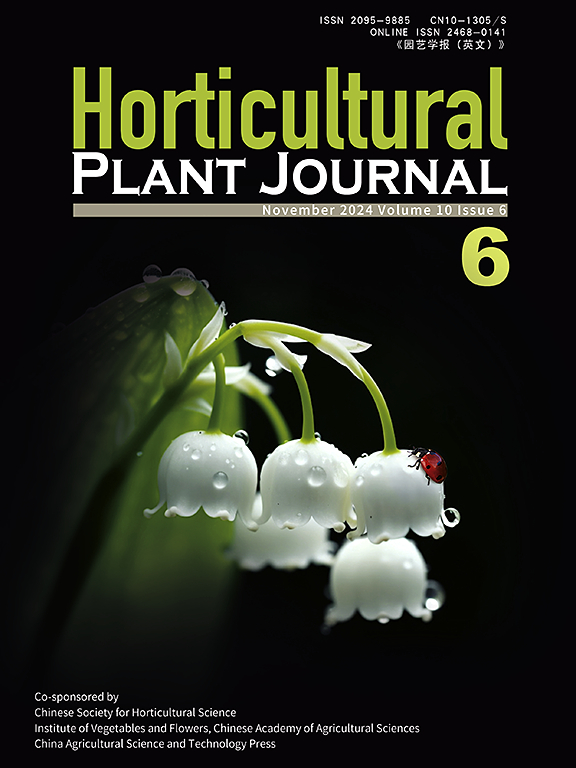番茄高温下mi -1介导的根结线虫免疫相关基因的鉴定
IF 6.2
1区 农林科学
Q1 HORTICULTURE
引用次数: 0
摘要
根结线虫(Root-knot nematodes, RKNs)是一种臭名昭著的植物病原体,在全球范围内对园艺作物造成了重大损失。番茄RKN抗性基因Mi-1是目前唯一的商业化抗性来源。然而,当土壤温度超过28℃时,其有效性显著下降。尽管大量研究探索了由Mi-1介导的免疫信号通路,但对高温影响植物的特异性免疫反应及其涉及的关键温度敏感基因仍知之甚少。在这项研究中,我们证明了mi -1介导的超敏反应在32°C时受损。在这个温度下,根系中活性氧(ROS)的产生减少,而胼胝质沉积增加。通过对比转录组分析,在24°C和32°C之间,我们发现了激素信号通路、免疫信号通路和基因选择性剪接的显著变化。例如,在32°C时,茉莉酸(JA)途径上调,水杨酸(SA)途径被抑制。高温也破坏了MAPK级联并影响代谢物合成。值得注意的是,大多数在24°C时上调的基因在32°C时下调。此外,病毒诱导的基因沉默(VIGS)实验证实,干扰JA生物合成关键基因MYB转录因子AOS3、脱落酸(ABA)合成调控基因JA2和热应激转录因子A-6b等差异表达基因的表达,增加了Mi-1番茄对RKNs的敏感性。这些发现为研究抗Mi-1的温度敏感性提供了重要的见解,并支持了抗rkn番茄在高温条件下仍然有效的开发。本文章由计算机程序翻译,如有差异,请以英文原文为准。
Identification of genes involved in the tomato Mi-1-mediated immunity to root-knot nematodes parasitism under high temperature
Root-knot nematodes (RKNs) are notorious plant pathogens that cause substantial losses in horticultural crops globally. The tomato RKN resistance gene, Mi-1 , is currently the sole commercially available source of resistance. However, its effectiveness significantly declines when soil temperatures exceed 28 °C. Although numerous studies have explored the immune signaling pathways mediated by Mi-1 , the specific plant immune responses affected by high temperatures and the key temperature-sensitive genes involved remain poorly understood. In this study, we demonstrated that the Mi-1 -mediated hypersensitive response is impaired at 32 °C. At this temperature, the production of reactive oxygen species (ROS) in roots is reduced, while callose deposition increases. Through comparative transcriptome analysis between 24 °C and 32 °C, we identified significant changes in hormone signaling pathways, immune signaling, and gene alternative splicing. For instance, the jasmonate (JA) pathway was upregulated, and the salicylic acid (SA) pathway was inhibited at 32 °C. High temperatures also disrupted the MAPK cascade and influenced metabolite synthesis. Notably, most genes upregulated at 24 °C were downregulated at 32 °C. Furthermore, virus-induced gene silencing (VIGS) assays verified that interfering with the expression of differentially expressed genes, such as the JA biosynthesis key gene MYB transcription factor AOS3 , the abscisic acid (ABA) synthesis regulation gene JA2 , and the heat stress transcription factor A-6b , increased the susceptibility of Mi-1 tomatoes to RKNs. These findings offer crucial insights into the temperature sensitivity of Mi-1 resistance and support the development of RKN-resistant tomatoes that can remain effective under high-temperature conditions.
求助全文
通过发布文献求助,成功后即可免费获取论文全文。
去求助
来源期刊

Horticultural Plant Journal
Environmental Science-Ecology
CiteScore
9.60
自引率
14.00%
发文量
293
审稿时长
33 weeks
期刊介绍:
Horticultural Plant Journal (HPJ) is an OPEN ACCESS international journal. HPJ publishes research related to all horticultural plants, including fruits, vegetables, ornamental plants, tea plants, and medicinal plants, etc. The journal covers all aspects of horticultural crop sciences, including germplasm resources, genetics and breeding, tillage and cultivation, physiology and biochemistry, ecology, genomics, biotechnology, plant protection, postharvest processing, etc. Article types include Original research papers, Reviews, and Short communications.
 求助内容:
求助内容: 应助结果提醒方式:
应助结果提醒方式:


